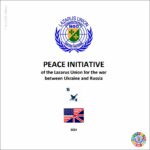A Day to Celebrate the Role of Television in Connecting and Informing the World On 21st November, we commemorate World Television Day, a UN-designated day recognising television’s critical role in... Read more
ECHO OF TERROR
The Olympic idea between ideal and reality
This essay reflects the private opinion of O.M. Gruber-Lavin only, and is not an official statement of the Lazarus Union
The Olympic Games are a fascinating symbol of universal peace and international harmony. Since their ancient origins, they have established themselves as a moment of peace in an often conflict-ridden global political climate. However, this ideal has been repeatedly called into question by brutal realities. In particular, the attack on the 1972 Olympic Games in Munich and the recent events surrounding the 2024 Games show how difficult it is to realise this idealism in the real world. On today’s anniversary of the Munich attack, a new attack on the Israeli consulate in Munich is a painful reminder of the ongoing drama and repeated inability to keep the Olympic peace.
The ancient tradition: peace and competition
In ancient times, the Olympic Games were more than just a sporting event; they were a symbol of peace. During the Olympic Games, the ‘Ekecheiria’ was declared in Greece, a sacred truce that allowed athletes and visitors to travel and experience the Games in safety. This tradition was not only an act of sporting competition, but also a deeply rooted cultural and religious commitment to cease hostilities and ensure a state of peace during the Games.
The idea behind the Ekecheiria was simple: through sporting competition, all conflicts were to be put to rest for the duration of the games in order to honour the humanistic spirit of sport and promote the common good. It was an idealistic attempt to resolve the conflicts of the time through dialogue and competition.
The 1972 assassination attempt: a brutal end to Olympic harmony
The 1972 Olympic Games in Munich were a far cry from the ideals of the ancient Ekecheiria. On 5 September 1972, members of the Palestinian terrorist group ‘Black September’ attacked the Israeli team, resulting in a tragic and bloody incident in which eleven Israeli athletes were murdered. The attack was a harrowing sign of how Olympic peace can be destroyed by deep-rooted political conflict and extremist violence.

This incident called into question not only the security arrangements of the Olympic Games, but also the fundamental question of whether Olympic peace is a realistic and achievable vision, or merely an unattainable ideal that is continually undone by the brutal realities of the geopolitical world.
The reality of 2024: a new attack, a new shadow
On today’s anniversary of the 1972 assassination attempt, a new attack on the Israeli consulate in Munich is a reminder of the continuing relevance and drama of geopolitical conflicts. Although the modern security apparatus has come a long way and the world has become safer in many ways, the world of international politics remains a place of constant insecurity and violence.
The attack on the consulate is a painful reminder that even in times of global celebrations such as the Olympic Games, the ideals of peace and harmony often face harsh tests in reality. The world has changed since 1972, but the fundamental conflicts and violence that dominate the world stage remain. The fact that such an attack was carried out on the anniversary of the Munich massacre is particularly symbolic and emphasises the constant challenge of maintaining peace in a conflict-ridden global context.
The gap between ideal and reality: the inevitable conflict
The repeated collision between the ideals of the Olympic Games and the brutal reality of geopolitical violence reveals a deep gulf between the idea of a harmonious international community spirit and the harsh reality of geopolitical tensions. The ancient games had their place in a different world, and today’s games, despite all efforts to create a moment of peace, cannot always guarantee this historical continuity of peace.
The challenges of contemporary world politics, including the ongoing Israeli-Palestinian conflict, illustrate that the Olympic Games often serve as a stage for reflection rather than a solution to global conflicts. The days of remembrance and commemoration such as today remind us of the continuing relevance of these conflicts and that the ideals of the Olympic Games – peace, harmony and international co-operation – are constantly being put to the test.
An unfinished ideal
The Olympic ideal of Ekecheiria, which the ancient Greeks attempted to realise, remains a fascinating and ambitious goal. Yet the reality of the geopolitical violence we see today, particularly in the contexts of 1972 and 2024, shows us how difficult it is to turn this idealism into reality. As the world continues to face conflicts that challenge the Olympic vision of universal harmony, the desire for peace remains a constant, if often unattainable, ideal.
Today’s events are a painful reminder that the journey towards true global peace is far from complete and that we must continue to strive to bridge the gap between ideal and reality. The Olympic Games remain a shining symbol of these endeavours, but also a reflection of the challenges that must be overcome on the road to peace.








